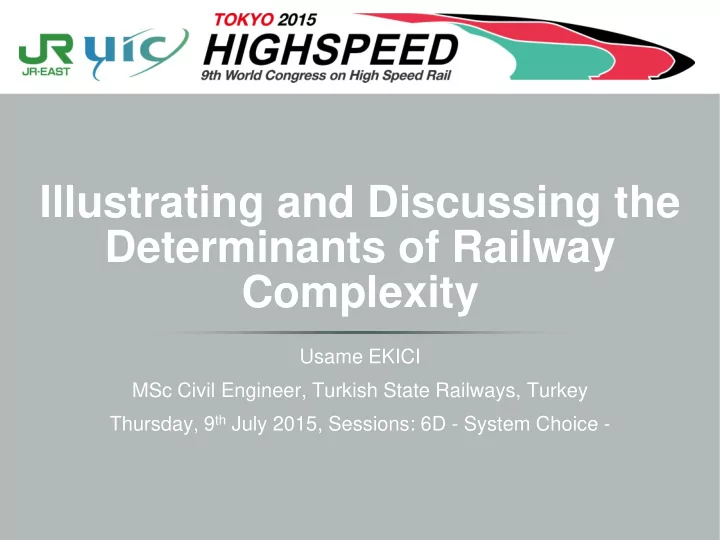

Illustrating and Discussing the Determinants of Railway Complexity Usame EKICI MSc Civil Engineer, Turkish State Railways, Turkey Thursday, 9 th July 2015, Sessions: 6D - System Choice -
Content of the Presentation Background Information on Complexity of Railways Analysing Determinants of Comlexity with Examples • Diversity • Variability • Dispersion • Interdependence Findings and Recommendations Conclusion Usame EKICI MSc Civil Engineer, Turkish State Railways, Turkey 2 Thursday, 9th July 2015, Sessions: 6D - System Choice -
Complexity of Railways What is Complexity? Complexity is generally used to characterize something with many parts where those parts interact with each other in multiple ways. Why Railway Systems are Complex? Railway systems involve great variety of components and these components have to interact with each other in a correct manner in order for the system to be safe. What are the Determinants of Railway Complexity? Complexity of Railways can be classified as: • Diversity • Variability • Dispersion • Interdependence All these determinants have both physical and organisational effects on railway systems. Usame EKICI MSc Civil Engineer, Turkish State Railways, Turkey 3 Thursday, 9th July 2015, Sessions: 6D - System Choice -
Diversity Railways have numerous different kinds of technical and organisational subsystems and components: • Technically: Type of the elements used in railway construction, maintenance and operation. (Different type of sleeper, rail, rolling stock, etc.) • Organisationally: The type of train services running for different purposes. (Freight train service, high-speed passenger, etc.) Also, type of control systemsand traffic operations. (line-side signalling, automated systems, urban traffic, regional services, etc.) Usame EKICI MSc Civil Engineer, Turkish State Railways, Turkey 4 Thursday, 9th July 2015, Sessions: 6D - System Choice -
Diversity Usame EKICI MSc Civil Engineer, Turkish State Railways, Turkey 5 Thursday, 9th July 2015, Sessions: 6D - System Choice -
Variability Conditions are not always same! Weather, nature and requirements vary. The most importantly, people change their minds! A successful railway system must satisfy all requirements in any condition. � � � Usame EKICI MSc Civil Engineer, Turkish State Railways, Turkey 6 Thursday, 9th July 2015, Sessions: 6D - System Choice -
Dispersion It is essential for all transport sector businesses to distribute their staff and assets widely. True staff allocations should be made for each parts in the system and job definitions should be made clear. While planning a railway route, locations of assets, customers and staff have to be decided � after proper analyses and statistics. Usame EKICI MSc Civil Engineer, Turkish State Railways, Turkey 7 Thursday, 9th July 2015, Sessions: 6D - System Choice -
Interdependence In railway systems, almost all components are dependent on each other. Subsystems always interact with each other and they are all tightly coupled. The rail is a characteristic of civil engineering and wheel is of mechanical engineering but they both behave according to each other’s needs and limitations in order to operate the trains economically and safely. Locations of railway stations should be decided considering people’s availability to reach. So it is depended on the other public transport systems. � Usame EKICI MSc Civil Engineer, Turkish State Railways, Turkey 8 Thursday, 9th July 2015, Sessions: 6D - System Choice -
Interdependence Railway operation is dependent on maintenance works. Railways can be interacted with maintenance works even maintenance is not on the railway line. Organisationally, standards and laws tell how to build a railway and how to operate. Rules and standards are researched by experts to ensure safe operation of trains, and they have to be obeyed. Usame EKICI MSc Civil Engineer, Turkish State Railways, Turkey 9 Thursday, 9th July 2015, Sessions: 6D - System Choice -
How to Eliminate Problems Due To Complexity Major problems occur due to difficulty of complexity. Sources of complexity should be analysed carefully. Experience and team work are the vital parts in this process. Good project planning and management minimises the problems of complexity. Usame EKICI MSc Civil Engineer, Turkish State Railways, Turkey 10 Thursday, 9th July 2015, Sessions: 6D - System Choice -
Systems Engineering Approach as a Solution Systems engineering approach should be adapted to projects. That will provide traceability and help minimise the risks of complexity. Railways are highly complex systems and problems arising from complexity can be minimised if the determinants of complexity are well understood. Usame EKICI MSc Civil Engineer, Turkish State Railways, Turkey 11 Thursday, 9th July 2015, Sessions: 6D - System Choice -
...Thank you for your kind attention
Recommend
More recommend